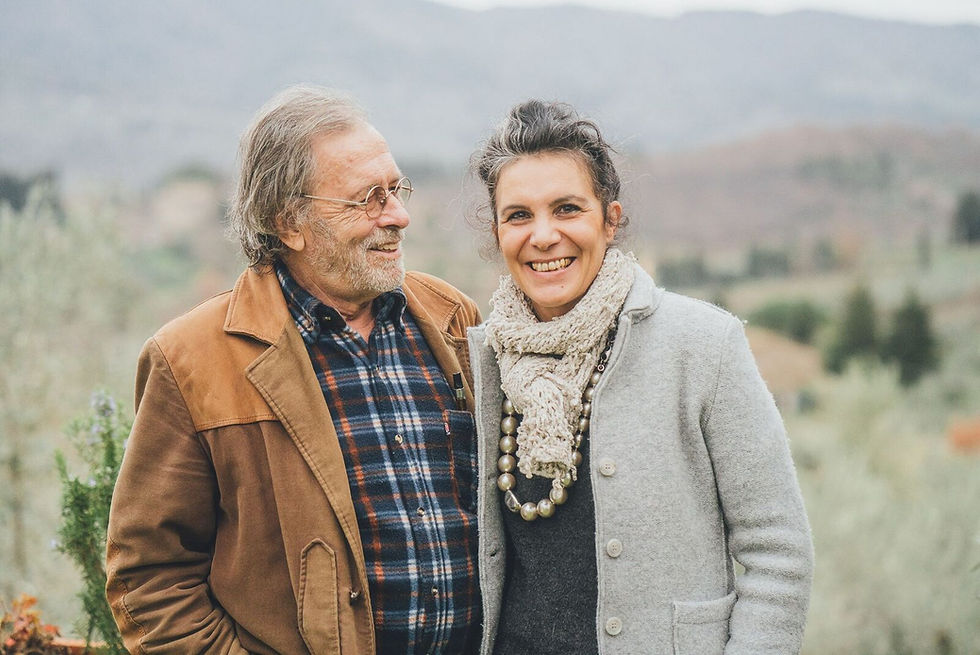Protecting His Community's Identity
- post93960
- Sep 6, 2025
- 11 min read
Updated: Sep 30, 2025
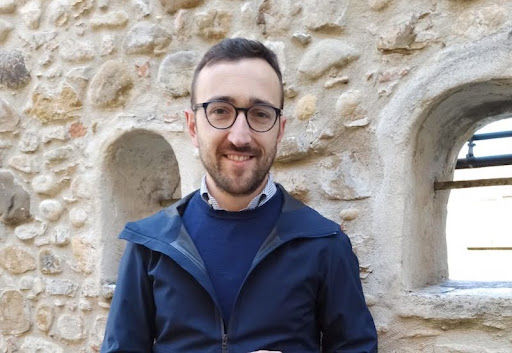
We interview Giulio Saturnini on how Greve in Chianti can innovate on its distinctive "Slow City" culture in a modern age.
This interview was conducted with Giulio Saturnini by Pacific University interns and travel class students over several meetings at the Town Hall located on the Piazza Matteotti in Greve.
A solid, square Tuscan structure dating back to the 16th century, the Palazzo Comunale (as the town hall is called in Italian) is imposing as we enter through its massive door. As we make our way up the stone steps to the second floor, we pass city employees calling cheerfully to each other, and the atmosphere seems to lighten up. Walls throughout the building are lined with framed documents related to Greve’s history.
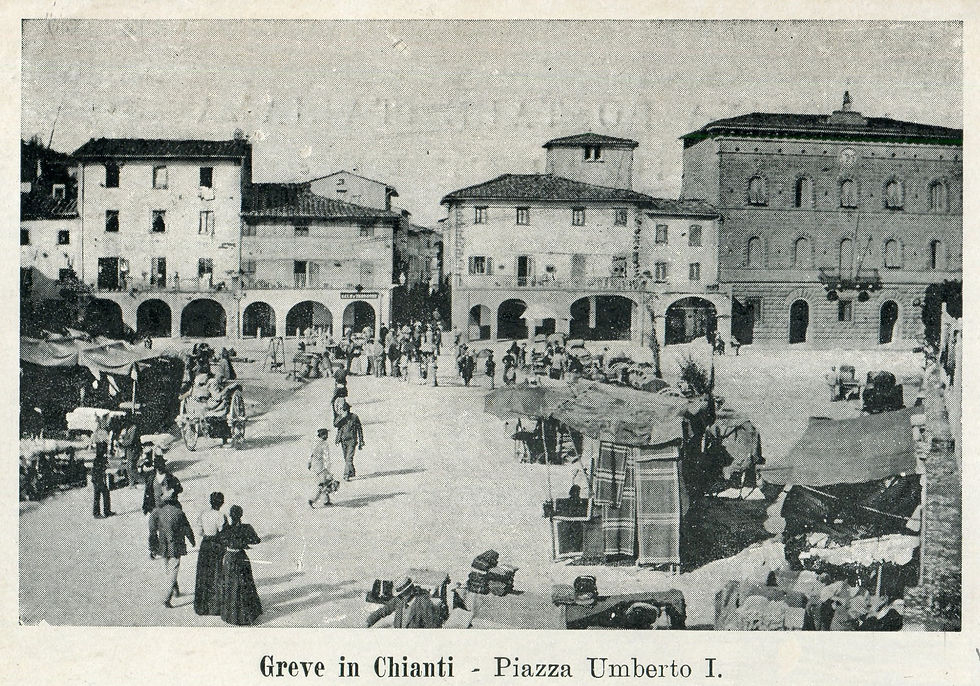
After a short wait outside the official reception room, we are ushered in and directed to chairs lined up to face a formal table. Out the window to our left is the distinctive triangular piazza, sun-warmed and busy with tourists and local shoppers. On the pale walls around us are painted what appear to be old family seals and other official insignias.
Councilor Saturnini enters wearing the official sash, bright with the colors of Italy's flag, that indicates his position. He settles into a wooden chair facing us. By all appearances, he seems young and modern, but we are a little daunted by the weight of history in the air. How much official business has been conducted in this room over the centuries?
Saturnini says, “My English is not that good, but let’s begin.”
We will soon find out that his English skills are in fact excellent, and that he will generously consider any question we ask, including some that amuse him. (“What’s your favorite pasta?” one of the students inquires. Answer: “Simple out of the box spaghetti with a tomato sauce. “ This response tells you all you need to know about the easy presence of this down–to-earth, accessible champion for his hometown. He does not take himself too seriously.)
Giulio Saturnini, age 37, comes to political activism by way of his parents, who were both dedicated to the local community. He graduated from the University of Florence with a degree in political science. About ten years ago, he became politically active and was asked to join Greve’s city government. Recently he was re-elected to the city council. His official role is Greve City Councilor for Public Works, Promotion, and Tourism.
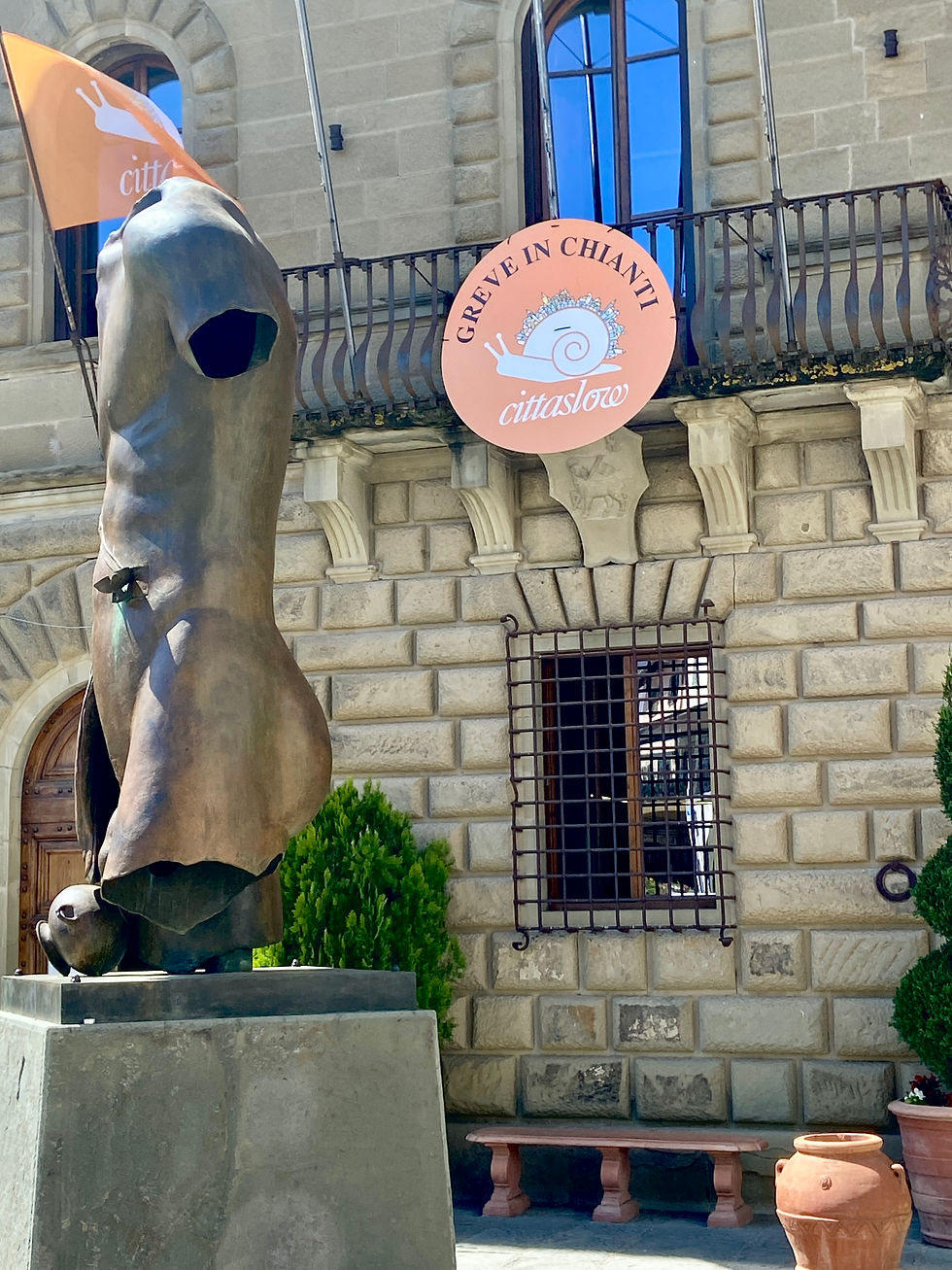
Saturnini’s father. Paolo Saturnini, was Mayor of Greve in Chianti. Giulio grew up to a life of service and has spent many hours inside this very building watching his father and his friends at work for the community. Whenever he speaks of his father, Giulio is visibly moved. Paolo Saturnini passed in 2020.
Greve in Chianti was one of the first cities to honor the charge of Cittaslow, which includes: Respect the environment, promote local goods and agriculture, and treat everyone–locals and visitors–with respect.
In 1999, Mayor Paolo Saturnini founded the Cittaslow (or Slow City) organization. An outgrowth of the international Slow Food movement, Cittaslow is a more expansive effort by a consortium of cities to encourage sustainable values.
Greve in Chianti was one of the first cities to honor the charge of Cittaslow, which includes: Respect the environment, promote local goods and agriculture, and treat everyone–locals and visitors–with respect. These are just a few of the movement’s admirable goals. There are now 305 cities involved in the global membership, from Sonoma, California, to Halfeti, Turkey to Jingyan, China.

When we conducted research for this article, Paolo Saturnini’s groundbreaking work and dedication to the establishment of Cittaslow came up numerous times. We are interested in how his son, Giulio, is continuing his legacy as well as the causes most important to Giulio in his own work for the city.
What do you think should be the main goal of a local government? Do you feel like this goal ever conflicts with your own personal desires for the community?
“We need to build a “vital, vibrant and vivible” environment,” Giulio Saturnini says. Vivible? We pause for a moment to sort through its meaning. Vivable is originally a French term that captures a sentiment that can roughly be described as good living.
Although it might be tempting to simply translate the word as “livable," Saturnini’s use of vivable contains the intention to encourage members of the community to create positive connections for a quality living environment.
Although it might be tempting to simply translate the word "vivable"as “livable," Saturnini’s use of vivable contains the intention to encourage members of the community to create positive connections for a quality living environment.
How is this kind of productive interaction possible? He explains, “Well first there has to be a relationship of trust between the citizens and local government. Those who do this work need to be honest and hold ourselves accountable. That’s the only way.”
We understand you are a member of the Democratic Party (Partito Democratico), which is different than the Democratic Party in the US. We’ve grown up with a largely two party system in our home country, while Italy has an established multi-party system. Can you help us understand the goals of your party and how they are a good fit for a town like Greve?
[The rest of his answers to our questions are in Councilor Saturnini’s own words. Some of his answers have been edited for brevity.]
Try to keep in mind is that while there is a left and right wing in Italy, it's a completely different situation in Greve, not only because of changes in the last 20-30 years [when immigration has increased while the birth rate and population of Italy as a whole has dropped] , but also because it's difficult to have a direct link between national policies and a local government like Greve’s.
We have to work more closely with each other and across party differences here.
For example, immigration. How to handle this challenge is an ongoing debate all over Italy. There are newer immigrants who have lived and worked in Greve for a couple of years, and the Democratic Party members have been trying to help them integrate into the community. There have been blocks, like language and passports, but in many cases those obstacles have been overcome. Other parties might just ignore those problems, but our intention is to reach out and help.
What are the core values of slow living? What steps do you want to take to ensure that the town honors and builds on those values?
Twenty five years ago, my father and other town leaders were trying to bring the Slow Food movement into Greve’s administration. Back then, we were fighting a very different enemy: fast food franchises. We did not want to see a MacDonald’s built on the piazza one day.
Nowadays everything is fast because of globalization, so the enemy is much bigger. The main principle of slow living is supporting the identity of a community, and so Greve's administration should make choices to go in that direction.
You have to keep alive the soul of the community, otherwise it is all meaningless.
The local people have not wanted big hotels, chain restaurants, or golf courses, so they have written the city planning with that in mind. The majority have been against that kind of growth for a couple of reasons. It would be a risk for the image of the town. We have shaped some of our economy to the expectations of paying visitors who want the slower experience. And of course that kind of growth would have a dangerous impact on local resources and the environment.
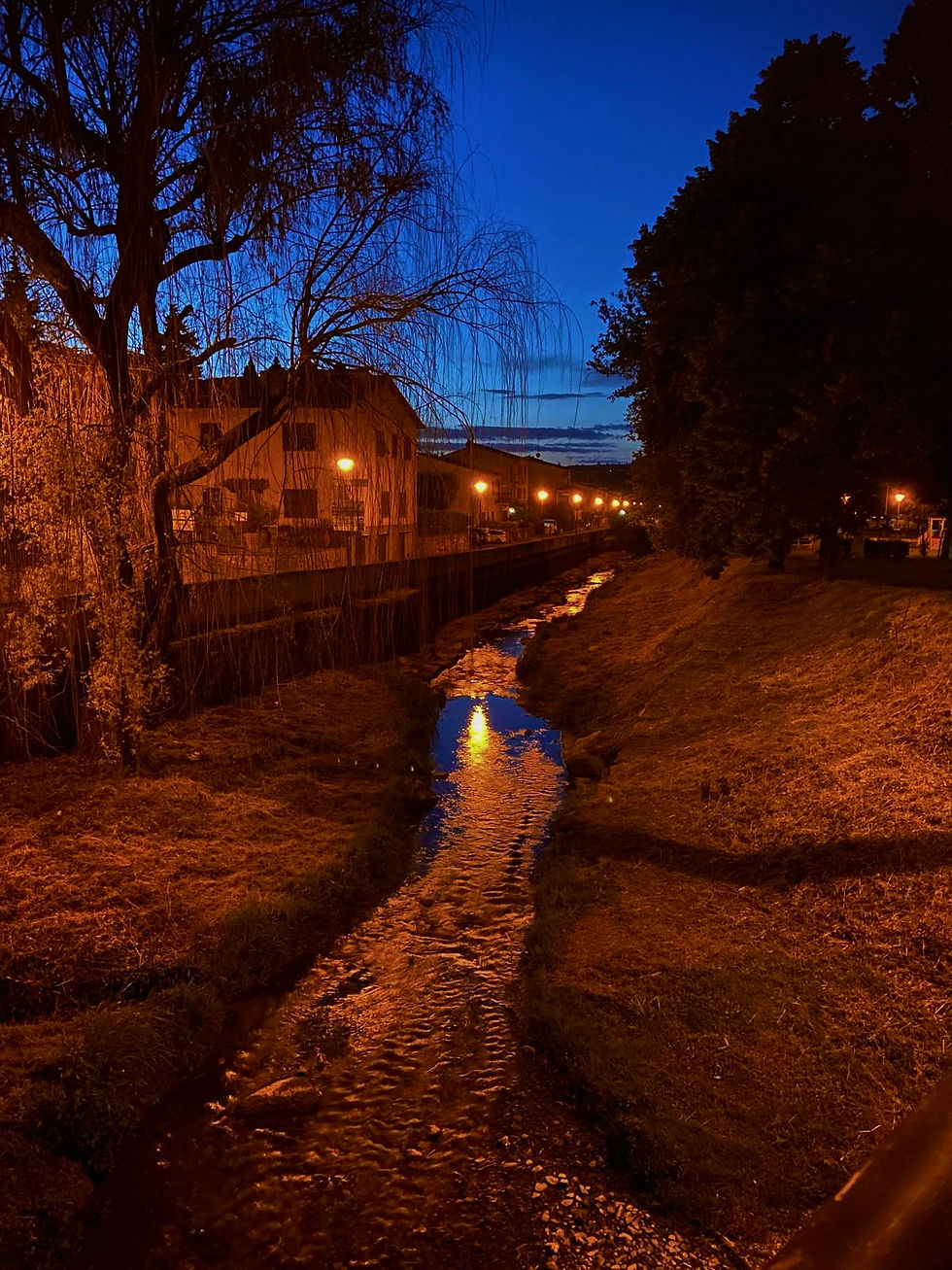
The Chianti region has its own things to be proud of. It is important to convince property owners to stay true to their own culture.
[He pauses and then continues on with his answer so we can better grasp his meaning.]
You have to keep alive the soul of the community, otherwise it is all meaningless. Even though these things (sushi, athletic shoes, clothing made in other countries) aren’t bad, it’s necessary to impress that this culture, our culture, is important because it is our own and unique. Yes we are a touristic place, but our priority should be about sharing our local perspective.
Other places might not care, but Greve should.
Moving forward, what do you think are the best ways to further involve the community in building a legacy of slow living that will continue to be there for future generations? Is there anything you think more people and businesses should adopt?
Just this past weekend, I was at a Cittaslow/Slow City convention. It’s obvious to everyone who cares that this movement can only survive if it adapts to the challenge of the globalized world. Sadly, we have mostly lost the battle against fast food. Many restaurants and markets outside of smaller towns like Greve have become franchised.
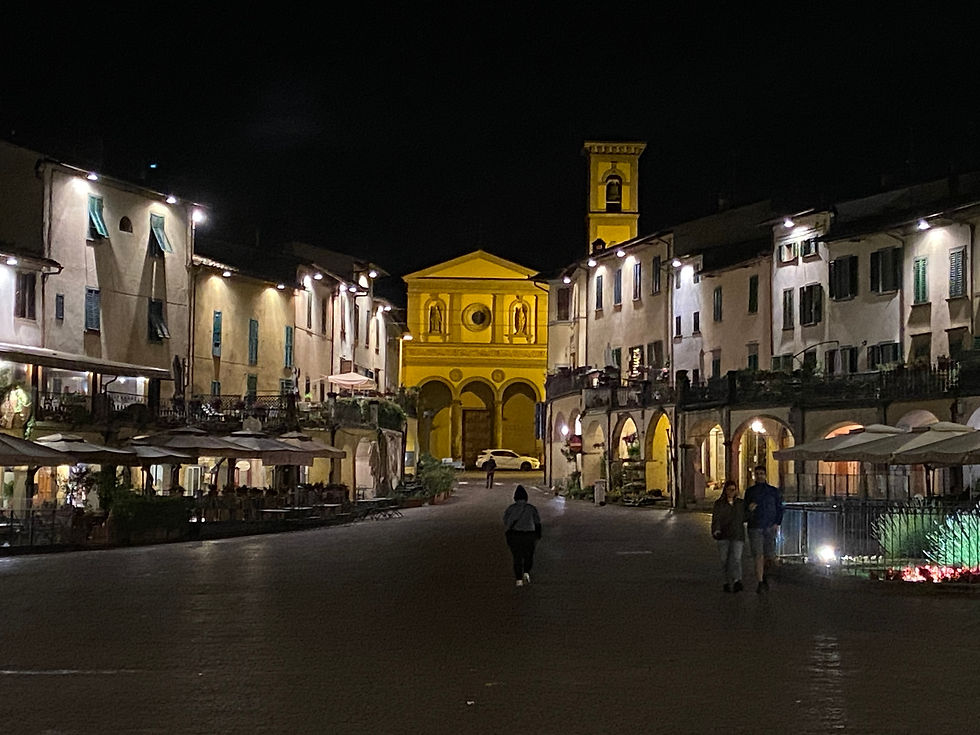
The message of Cittaslow has to be adapted to the realities of the fast life most of us live now. Some of the Cittaslow values can include the “right to disconnect” from the internet, to reduce weekly working hours, and to regain spaces for personal and not commercial interests. For example people in Greve would like to see more benches in our parks and places for us to gather and connect. We can find more ways like this to protect the identity of a place in an innovative way.
Some of the Cittaslow values can include “right to disconnect” from the internet, to reduce weekly working hours, and to regain spaces for personal instead of commercial interests.
“Protection” has this negative connotation, but this protection has to have forward movement. We cannot refuse the new and other ways of doing things, but we must at the same time remember where we come from. It is a thin line to live upon, but we have to find it.
We are having the the great opportunity to meet practicing artists who have chosen to live or spend time practicing their work in Greve. Does art play a role in everyday life of residents here?
We have art displayed and for sale around Greve. We are always trying to fund and develop more. One of the most interesting additions has been the statue downstairs in front of the city hall. [The striking bronze sculpture by Igor Mitoraj shows a much larger than life male torso with wings, akin to a Roman god or warrior. The headless statue causes some tourists to do a double take, in part because of its exposed male genitals.]
It was a bold decision by city leaders to place this controversial piece in the main piazza in front of the town hall back in 2001. Greve was still a rural farm town then. There was much debate. The local priest was not happy.
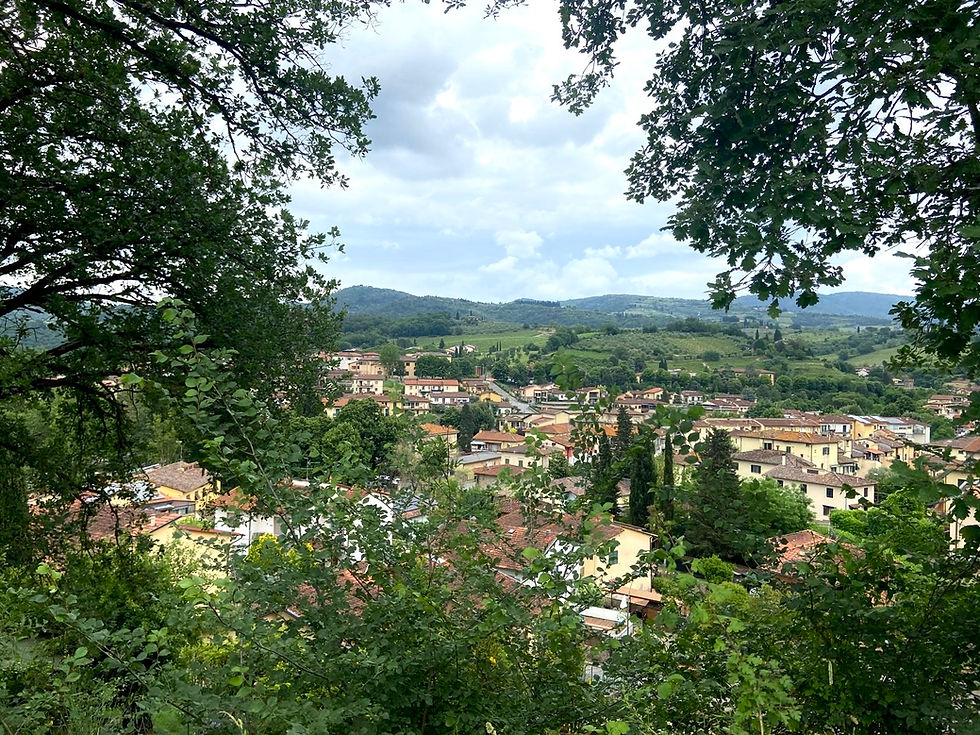
But with time the statue helped shift the local perspective on art, and contemporary art especially. We found a way to talk about our art. Florence [located 20 miles to the north of Greve] is all about the Renaissance. I think we were brave to establish our own artistic ideas. Those are reflected in more of the art that has appeared here.
As students, we wonder how younger people in Greve in Chianti negotiate small town life. Is the Catholic Church part of their daily lives?
Because of how our educational system works in this part of Tuscany, after age 13 or 14 you have to go to school in Florence. Most students take the city bus into the city each morning. They can do sports here in town.
We cannot refuse the new and other ways of doing things, but we must at the same time remember where we come from. It is a thin line to live upon, but we have to find it.
As for the church: I don’t know the numbers regarding who attends. I’m agnostic. In fact I’m not even baptized because my parents decided to let me choose. I’d say only 5 to 10 percent of my friends are religious. They have their kids baptized, but my partner and I chose not to do that with our daughters. Honestly, given what’s going on in the world right now, I guess I’m a little jealous sometimes of those who have faith because they probably have more answers than I do. [He smiles gently.]
What has been the local reaction to the new pope?
The new pope [Pope Leo XIV]] has generated a lot of interest in Italy, but I would say that’s mostly because of the political aspect. He’s the first American-born pope. In reality there’s a big distance between Rome and the church in Greve.
It might be surprising for you to hear that we are mostly not connected to what happens in the Vatican. The basilica on the piazza [Santa Croce] does have a presence here and elderly residents often attend mass. The church offers concerts in the summer that are also popular.
Are the people in Greve concerned about climate change and protecting green spaces?
We talk much more here about how to keep our environment healthy. Climate change is affecting us too. Writer and botanist Stefano Mancuso, a professor at the University of Florence, has written interesting books about the intelligence of plants. I invited him to speak in Greve, and a lot of people came to listen to him. We’re trying to apply some of the principles he promotes.
For example, planting as many trees as you can as a grassroots initiative is not really that expensive. I’m convinced that’s important, although tree planting applies more to big cities. Greve’s territory is about 180 thousand square kilometers, one of the biggest in Tuscany, but our population is only about 13,000 people spread across the town itself and the farms and small country villages. The rest is forests.
Climate change is touching us, so we have to think about how to address it. We see the reality in the winemaking industry, where it is affecting the taste and the smell of the wine.
So for our community it’s more important to prevent big buildings and promote public transport to and from Florence. We have this beautiful road connecting us to Florence which is full of postcard picture views. At the same time, the buses that come through Greve are not convenient for our community in terms of travel time and schedule. So maybe we should invest more in public transportation, perhaps with electric buses that run on a separate lane or a similar kind of solution.

When we construct new buildings, we can also be more thoughtful. For example, if we cut 5 trees for this new house or business, maybe we have to plant 10 trees as a replacement. Climate change is touching us, so we have to think about how to address it. We see the reality in the winemaking industry, where it is affecting the taste and the smell of the wine. Some farms are moving their planting to higher altitudes because of the warming earth.
We notice many of the people who we have been fortunate to spend time with here like to talk about food and eating, so we have to ask: What is your favorite pasta dish?
Spaghetti from the box with simple tomato sauce. I’m not that great a cook. When I was growing up, I had tagliatelle made by my grandmother twice a month. But the store bought today is okay with me.
[This answer generates an incredulous response from us. This is Tuscany! We had imagined everyone would be very particular about everything they eat, especially pasta. For a few minutes after there’s a laughing discussion about food and we usually eat pasta from the box as well.]
We end our conversation with a final question about Cittaslow, a concept that has deepened for us as we’ve interviewed people in the community and learned more about their intentional work and lives. Do you believe the Cittaslow movement to be a lasting success here?
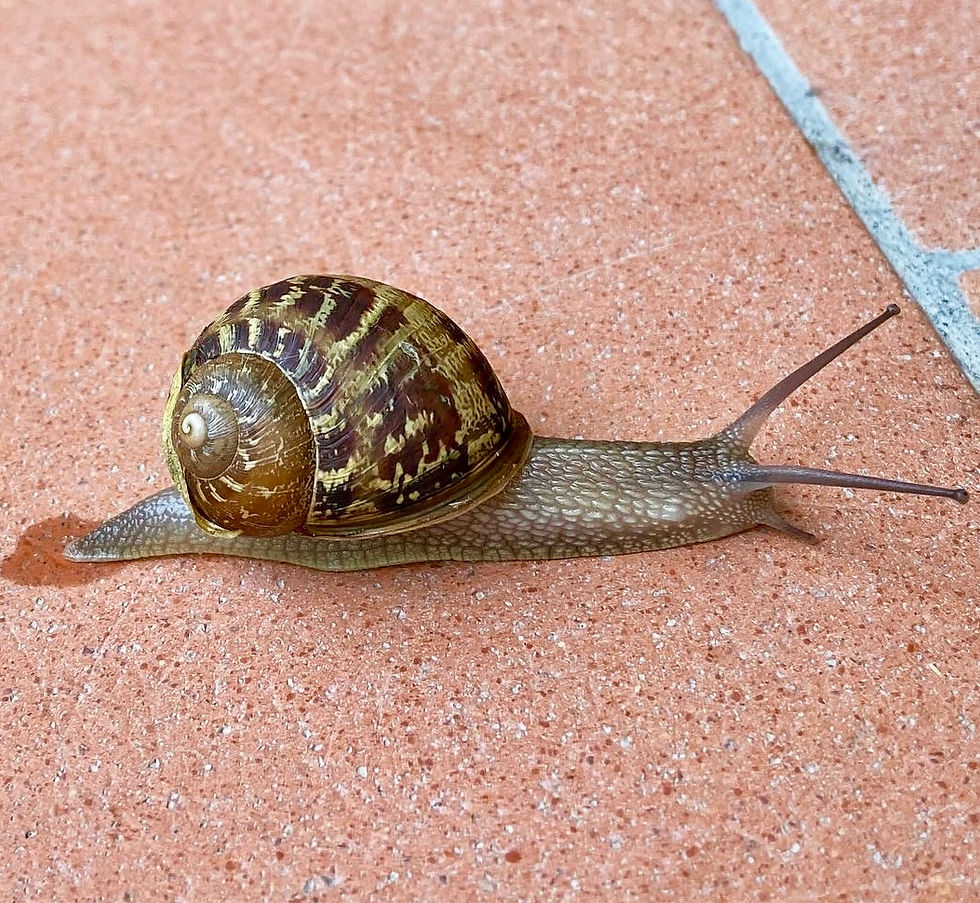
I’m not sure if our citizens today all understand that the Cittaslow [Slow City] movement was founded in Italy and how much Greve played a part, but I think those values have entered into the DNA of our community. We did not build big hotels here when tourism took off because they did not suit our way of life.
We can put something slow and thoughtful into our daily routines to reinforce this attitude. In that way we probably have already succeeded in Greve.
While there is constant pressure for that kind of development, we can look to Cittaslow to help us move forward thoughtfully.
It’s a way of thinking. We can put something slow and thoughtful into our daily routines to reinforce this attitude.
In that way we probably have already succeeded in Greve.
Article by Wren Bonham and Cryptid Parke with contributions by Elizabath Sargeant, Kathlene Postma, and Pacific University travel writing students.

